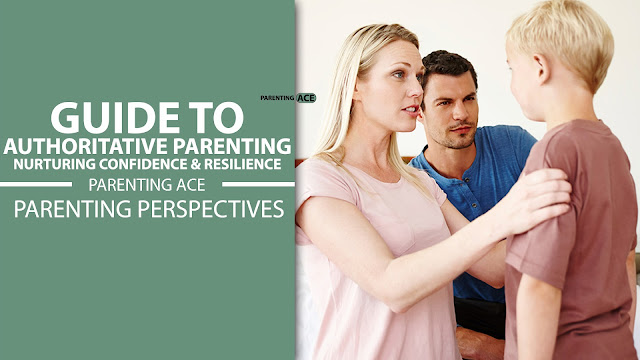Understanding Authoritative Parenting: A Comprehensive Guide to Nurturing Confident and Resilient Children
In the intricate tapestry of parenting styles, few approaches resonate as profoundly as authoritative parenting. With its blend of warmth, clear boundaries, and responsive guidance, authoritative parenting stands as a beacon of balance in nurturing children's development. In this blog post, we embark on an exploration of authoritative parenting, delving into its principles, characteristics, and the profound impact it holds on shaping confident, resilient, and well-rounded individuals. Join us as we unravel the intricacies of this empowering approach, offering insights and strategies to foster healthy parent-child relationships and support children in reaching their full potential.
 |
| Understanding Authoritative Parenting: A Comprehensive Guide to Nurturing Confident and Resilient Children |
Parenting is a profound responsibility that significantly shapes a child's development and future. Among the various parenting styles identified by psychologists, authoritative parenting stands out as a well-balanced approach characterized by warmth, support, and reasonable boundaries. In this comprehensive guide, we delve into the principles, characteristics, benefits, and strategies of authoritative parenting, aiming to provide insights into nurturing confident, resilient, and well-adjusted children.
Understanding Authoritative Parenting
Authoritative parenting is rooted in a nurturing and responsive approach that combines high levels of warmth with clear expectations and consistent discipline. Unlike authoritarian parenting, which tends to be rigid and controlling, authoritative parents strive to establish mutual respect, open communication, and autonomy within appropriate boundaries. They prioritize their children's emotional needs while also maintaining structure and guidance.
Characteristics of Authoritative Parenting
- Warmth and Support: Authoritative parents demonstrate warmth, affection, and empathy towards their children. They create a nurturing environment where children feel loved, valued, and secure.
- Clear Expectations: While being nurturing, authoritative parents also set clear and reasonable expectations for behavior, academic performance, and responsibilities.
- Open Communication: There is an emphasis on open and honest communication in authoritative households. Children are encouraged to express their thoughts, feelings, and concerns, knowing they will be heard and respected.
- Consistent Discipline: Authoritative parents employ consistent and fair discipline techniques that focus on teaching rather than punishing. Consequences for misbehavior are explained, and opportunities for learning and growth are provided.
- Autonomy with Guidance: Within the framework of clear expectations, authoritative parents allow children to make age-appropriate decisions and mistakes. They provide guidance and support while encouraging independence and self-regulation.
Benefits of Authoritative Parenting
- Positive Self-Esteem: Children raised in authoritative households tend to develop a strong sense of self-worth and confidence. The supportive environment fosters a belief in their abilities and encourages them to pursue their goals.
- Emotional Regulation: Authoritative parenting teaches children how to manage their emotions effectively. By providing a secure and responsive foundation, children learn to express and regulate their feelings in healthy ways.
- Social Competence: With open communication and guidance, children raised with authoritative parenting develop strong social skills and empathy. They learn to respect others' perspectives, communicate assertively, and navigate conflicts constructively.
- Academic Success: The combination of high expectations and support for learning contributes to academic achievement. Children are motivated to excel academically, knowing that their efforts are recognized and supported by their parents.
- Resilience: Authoritative parenting instills resilience in children, enabling them to adapt to challenges and setbacks. Through consistent support and guidance, children learn to persevere in the face of adversity and develop problem-solving skills.
Strategies for Practicing Authoritative Parenting
- Foster Open Communication: Encourage your child to express their thoughts and feelings openly, and actively listen to them without judgment.
- Set Clear Expectations: Establish rules and boundaries that are age-appropriate and consistent. Clearly communicate expectations and consequences for behavior.
- Provide Support and Guidance: Offer encouragement, praise, and assistance to help your child navigate challenges and achieve their goals.
- Be Responsive and Empathetic: Validate your child's emotions and offer support during difficult times. Show empathy and understanding towards their experiences.
- Lead by Example: Model the behaviors and values you wish to instill in your child. Demonstrate respect, kindness, and responsibility in your interactions with others.
Authoritative parenting offers a balanced and nurturing approach that promotes the holistic development of children. By combining warmth, support, clear expectations, and consistent discipline, authoritative parents create an environment where children thrive emotionally, socially, and academically. Through open communication, mutual respect, and guidance, authoritative parenting fosters confidence, resilience, and positive relationships, laying the foundation for children to lead fulfilling and successful lives. #ParentingPerspectives #FamilyFundamentals



Comments
Post a Comment